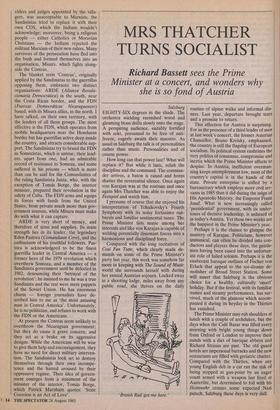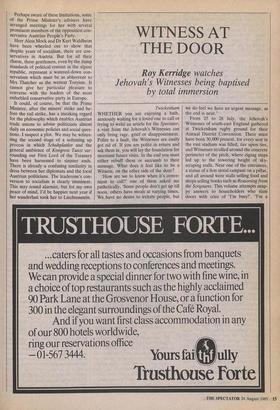MRS THATCHER TURNS SOCIALIST
Richard Bassett sees the Prime
Minister at a concert, and wonders why she is so fond of Austria
Salzburg EIGHTY-SIX degrees in the shade. The orchestra wielding varnished wood and gleaming brass drifts slowly onto the stage. A perspiring audience, suitably fortified with sekt, presumed to be free of anti- freeze, eagerly awaits their maestro. As usual in Salzburg the talk is of personalities rather than music. Personalities and of course power.
How long can that power last? What will replace it? But while it lasts, relish the discipline and the command. The comman- der arrives, a baton is raised and horns shatter the reverential silence. Once again von Karajan was at the rostrum and once again Mrs Thatcher was able to enjoy the Festspiel and watch him.
I presume of course that she enjoyed his interpretation of Tchaikovsky's Fourth Symphony with its noisy fortissimo out- bursts and familiar sentimental tunes. The Prime Minister lists music among her interests and like von Karajan is capable of welding potentially dissonant forces into a harmonious and disciplined force.
Compared with the long recitatives of Cosi Fan Tutte, which clearly made de- mands on some of the Prime Minister's party last year, this work was somehow far more in keeping with The Sound of Music world she surrounds herself with during her annual Austrian sojourn. Locked away in a shooting lodge, miles away from any public road, she thrives on the daily 'British Rail got me here.' routine of alpine walks and informal din- ners. Last year, departure brought tears and a promise to return.
This affection for Austria is surprising. For as the presence of a third leader of men at last week's concert, the former Austrian Chancellor, Bruno Kreisky, emphasised, the country is still the flagship of European socialism. Its political system enshrines the very politics of consensus, compromise and inertia which the Prime Minister affects to despise. In Austria, inefficient overman- ning keeps unemployment low, most of the country's capital is in the hands of the state. Private enterprise is stifled by a bureaucracy which employs more civil ser- vants in 1985 than it did during the reign of His Apostolic Majesty, the Emperor Franz Josef. What is now increasingly called 'presidential' government, with its under- tones of decisive leadership, is unheard of in today's Austria. Yet these two weeks are the happiest in the Prime Minister's year.
Perhaps it is the chance to glimpse the mastery of Karajan. Politicians, however unmusical, can often be divided into con- ductors and players these days, the gentle- men having been eased into the unfortun- ate role of failed soloists. Perhaps it is the exuberant baroque outlines of Fischer von Erlach that appeal to the soi-disante de- molisher of Broad Street Station. Some will assert that Salzburg is the obvious choice for a healthy, culturally 'smart' holiday. But if the festival, with its familiar names and steamy performances, has sur- vived, much of the glamour which accom- panied it during its heyday in the Thirties has vanished.
The Prime Minister may rub shoulders at lunch with a couple of archdukes, but the days when the Cafe Bazar was filled every morning with bright young things down from Oxford or London to improve their minds with a diet of baroque abbeys and Richard Strauss are past. The old guard hotels are impersonal barracks and the new restaurants are filled with geriatric chatter. Compared with the Thirties, when any young English deb in a car ran the risk of being stopped at gun-point by an eager count armed with a weapon last fired at Austerlitz, but determined to foil with his Heimwehr cronies some expected Nazi putsch, Salzburg these days is very dull. Perhaps aware of these limitations, some of the Prime Minister's advisers have arranged meetings for her with several prominent members of the opposition con- servative Austrian People's Party.
Herr Alois Mock and Dr Kurt Waldheim have been wheeled out to show that despite years of socialism, there are con- servatives in Austria. But for all their charm, these gentlemen, even by the damp standards of political contest in the alpine republic, represent a watered-down con- servatism which must be as abhorrent to Mrs Thatcher as the wettest Toryism. It cannot give her particular pleasure to converse with the leaders of the most enfeebled conservative party in Europe.
It could, of course, be that the Prime Minister, after the miners' strike and be- fore the rail strike, has a sneaking regard for the philosophy which enables Austrian trade unions to advise politicians almost daily on economic policies and social ques- tions. I suspect a plot. We may be witnes- sing the second stage of a softening up process in which Schuhplattler and the general ambience of Kongress Tanzt sur- rounding our First Lord of the Treasury have been harnessed to sinister ends. There is already a confusing similarity in dress between her diplomats and the local Austrian politicians. The leaderene's con- version to socialism is clearly imminent. This may sound alarmist, but for my own peace of mind, I'd be happier next year if her wanderlust took her to Liechtenstein.











































 Previous page
Previous page